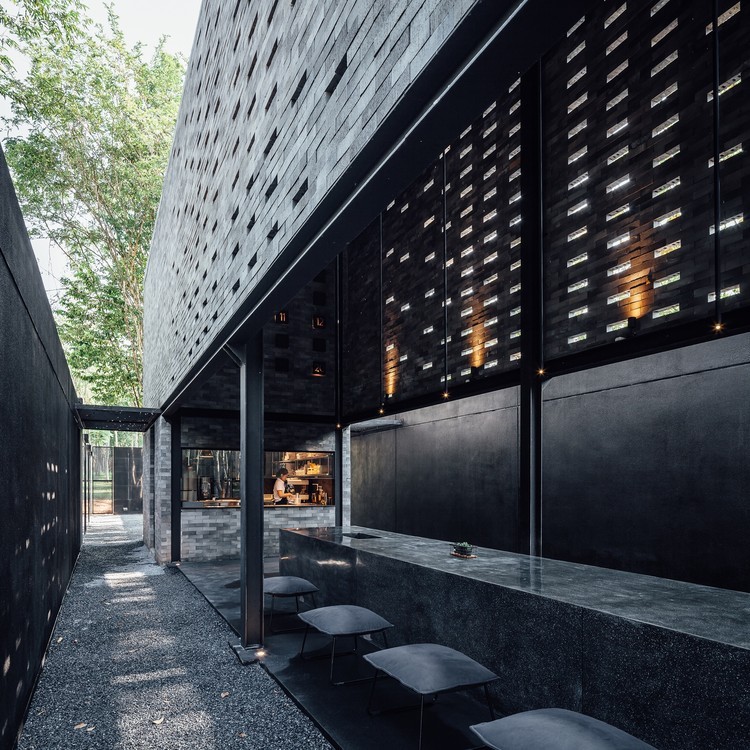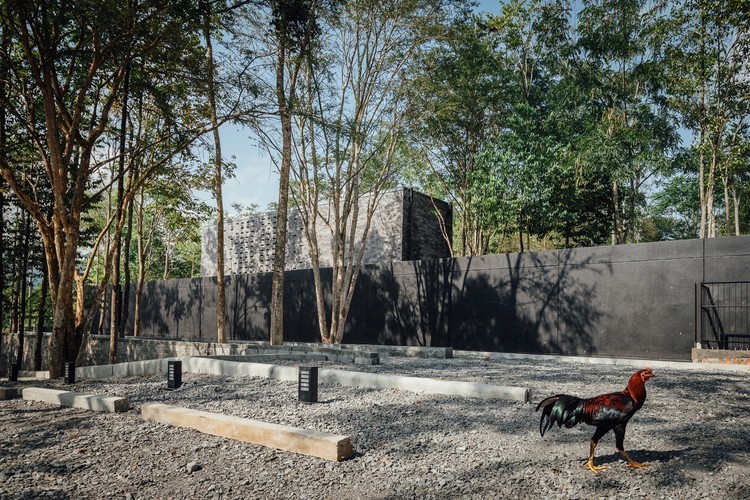查看完整案例


收藏

下载
© Ketsiree Wongwan
c.凯西里·王湾
架构师提供的文本描述。与此形成鲜明对比的是,该项目位于白崇区,靠近韩国游客最多的周末景点之一考雅国家公园(KhaiYai National Park)的周边。这个盛开的度假小镇主要被两种建筑所占据:一种是以大开口和山腰景观为主的建筑,另一种是复制西方建筑美学的建筑。但是黄色潜水艇上的咖啡罐却是另一回事。
Text description provided by the architects. Intertwining the Contrasts The project locates in Pak Chong district, near the perimeter of Khao Yai National Park, one of the country’s most visited weekend destinations. This blossoming vacation town is occupied mainly by two types of architecture; the ones predominated with large openings and access to hillside view, and those with the replicated aesthetics of Western architecture. But what Yellow Submarine Coffee Tank proposes is something different.
© Ketsiree Wongwan
c.凯西里·王湾
在介绍了印度桃花心木种植园1,600平方米的设计团队后,业主表示希望将建筑结合起来,为该土地创造新的价值,以供今后扩展。从第一次相遇开始,该网站就揭示了人工林的具体物理条件,从它的缓坡到非常独特的环境,有可能成为该地区最突出的地方之一。架构将有助于强调和理解这些元素。
After introducing the design team the1,600 – square meter land of Indian Mahogany plantation, the owner expresses the desire of incorporating architecture to create new values to the land for future expansion. From the first encounter, the site reveals the specific physical conditions of the planted forest from its gentle slope to the very unique ambience that has the potential to become one the area’s most prominent place. And architecture is going to help emphasize and understand these elements.
© Ketsiree Wongwan
c.凯西里·王湾
© Ketsiree Wongwan
c.凯西里·王湾
一系列3米高的墙包围了300平方米的面积,强调了建筑的不同规模和它所处的广阔景观,同时引导用户关注里面发生的事情。位于缓坡上的38米长的深色墙突出了场地陡峭程度的1.6米差异。为了从停车位进入咖啡舱,游客被引导沿着与建筑物平行的人行道,因为他们认为建筑和自然共存。咖啡厅只有三分之一的空间是有屋顶的,有空调的房间占了庇护所面积的一半。这类项目为用户提供了机会,让他们沉浸在四季变化的自然环境中。
A series of 3-meter-high walls encloses the 300-square meter area to underline the different scale of the structure and the vast landscape it locates in while leading users’ focus to what goes on inside. The 38-meter length of the dark wall situating on the gentle slope accentuates the 1.6-meter difference of the site’s steepness. To access the coffee tank from the parking space, visitors are led to follow the walkway locating in parallel with the building as they consider the coexistence of architecture and nature. Only one-third of the coffee house’s space is roofed with an air-conditioned room being one half of the sheltered area. Such program grants the opportunities for users to be immersed into natural surrounds that change through seasons.
© Ketsiree Wongwan
c.凯西里·王湾
功能空间分为三个部分:1)引入广阔空虚的入口;2)建筑功能与树木相似的部分;3)树冠下的区域。建筑是由不同颜色的黑色材料建造的,以创造一种环境,在这种环境中,某些元素通过吸收和反射过程而呈现出来。材料的物理相互作用有多种形式和效果,从吸收水分的砖块、砾石地面上的脚步声、有助于阻挡噪音的厚壁、在涂有中国墨水的聚集体墙上反射出来的闪光,到有光泽的瓷砖的反射。通过这些元素的集体能见度,“黑暗”用自己的语言说话。
The functional space is divided into three sections: 1) the entrance that introduces the vast and emptiness 2) the part where architecture functions similarly to a tree and 3) the area under the tree canopy. The architecture is constructed from materials with different shades of black to create an environment where certain elements become present through the processes of absorption and reflection. Physical interactions of materials can be seen in various forms and effects, from the brickwork that absorbs moisture, the sounds of footsteps on the gravelled ground, the thick walls that help blocking noises, the shimmering reflected light on the expose aggregate walls coated with Chinese ink, to the reflection of glossy tiles. Through the collective visibility of these elements, the ‘blackness’ speaks with its own language.
© Ketsiree Wongwan
c.凯西里·王湾
虽然已实现的建筑形式似乎与自然形成了很大的对比,但它与场地和周围环境有着很强的联系。封闭的空间让用户不仅可以看到,而且可以思考他们可能忽略的东西,从简单的人与人之间的互动到自然的谦逊壮丽。环境成为建筑的关键要素之一,空间的形成具有重要意义,它作为一个令人难忘的建筑空间为自己的角色和存在服务,同时也为人们对建筑的感知和态度增添了新的意识。
While the realized architectural form seems like quite a contrast to the nature, it possesses a strong connection with the site and the surroundings. The enclosed space allows users to not only see but contemplate the things they might have overlooked, from simple human interactions to the humble magnificence of nature. Ambience becomes one of the key ingredients of the architecture, and meaningfully, the space is formed, serving its own role and presence as a memorable architectural space while adding a new awareness to people’s perception of and attitude towards architecture.
© Ketsiree Wongwan
c.凯西里·王湾
Architects Secondfloor Architects
Location Chom View Khao Yai Village, Pak Chong, Pak Chong District, Nakhon Ratchasima 30130, Thailand
Category Coffee Shop
Project Team Sake Simaraks, Prasert Ananthayanont, Suebsai Jittakasem, Nutt La-Iad-On, Jatuphon Wangsong
Project Year 2015
Photographs Ketsiree Wongwan
Manufacturers Loading...
客服
消息
收藏
下载
最近

























